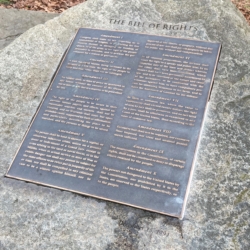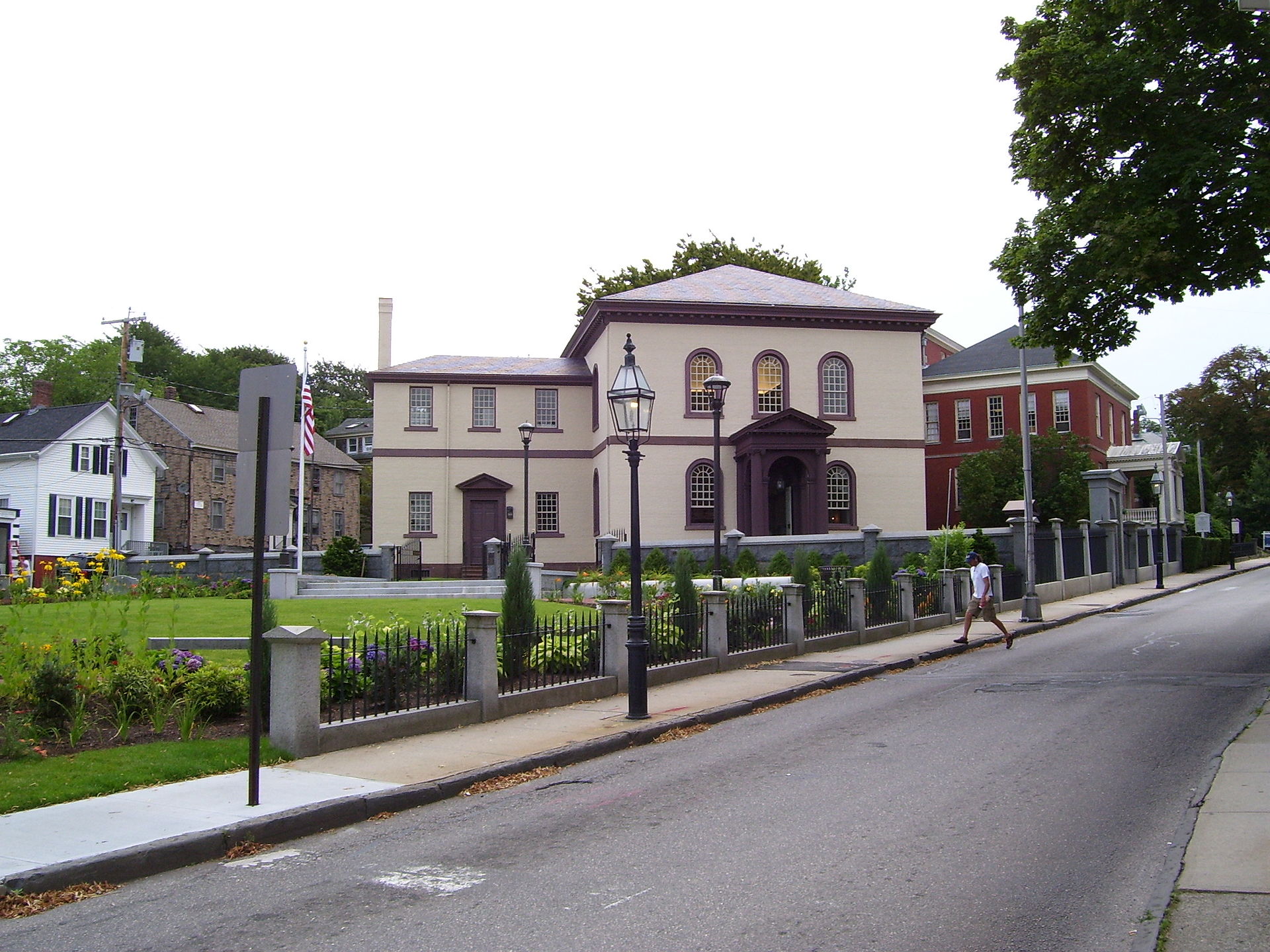Written by future founding father Benjamin Franklin in 1755, “A Parable Against Persecution,” also known as “the 51st Chapter [of Genesis],” is an example of what is often called ‘pseudo-biblicism,’ a trend from the 1740s to the mid-19th century of writing modern events in the already-archaic style of the King James Bible. More strictly, “A Parable Against Persecution” is an example of pseudepigrapha in that it is meant to be read as part of the book of Genesis, telling a story of Abraham facing a non-coreligionist, acting rashly, and learning a lesson about religious tolerance. Already in 1755 we can see Franklin’s radically liberal religious views.
For more information about the origin and history of this text, find “A Parable against Persecution, [July 1755],” Founders Online, National Archives. The Hebrew translation and cantillation is original.
| Translation (Hebrew) | Source (English) |
|---|---|
א וַיְהִ֤י אַחַר֙ הַדְּבָרִ֣ים הָאֵ֔לֶּה וַיֵּ֥שֶׁב אַבְרָהָ֖ם בְּפֶ֣תַח אׇהֳל֑וֹ כְּב֖וֹא הַשָּֽׁמֶשׁ׃ ב וְהִ֥נֵּה־אִישׁ֙ כָּפ֣וּף בְּזִקְנָ֔ה וַיָּבֹ֖א מִדֶּ֣רֶךְ הַמִּדְבָּ֑ר נִשְׁעָ֖ן עַל־שֵֽׁבֶט׃ ג וַיָּ֨קׇם אַבְרָהָ֜ם וַיִּפְגְּשֵׁ֗הוּ וַיֹּ֤אמֶר אֵלָיו֙ ס֥וּרָה־נָא֙ וּרְחַ֣ץ רַגְלֶ֔יךָ וְלִ֖ין כׇּל־הַלָּ֑יְלָה וְהִשְׁכַּ֣מְתָּ בַבֹּ֔קֶר וְהָלַכְתָּ֖ בְּדַרְכֶּֽךָ׃ ד וַיֹּ֤אמֶר הָאִישׁ֙ לֹּ֔א כִּי־תַּ֛חַת הָעֵ֥ץ הַזֶּ֖ה אֶעֱמֹֽד׃ ה וַיִּפְצַר־בּ֤וֹ אַבְרָהָם֙ מְאֹ֔ד וַיָּ֕סַר וַיֵּלְכ֖וּ הָאֹ֑הֱלָה וַיַּ֧אב אַבְרָהָ֛ם מַצּ֖וֹת וַיֹּאכֵֽלוּ׃ |
1 And it came to pass after these Things, that Abraham sat in the Door of his Tent, about the going down of the Sun. 2 And behold a Man, bowed[1] Kames version: “bent” with Age, came[2] Kames version: “coming” from the Way of the Wilderness, leaning on a Staff. 3 And Abraham arose and met him, and said unto him, Turn in, I pray thee, and wash thy Feet, and tarry all Night, and thou shalt arise early on the Morrow,[3] Kames version: “in the morning” and go on thy Way. 4 And the Man said, Nay, for I will abide under this Tree. 5 But Abraham pressed him greatly; so he turned, and they went into the Tent; and Abraham baked unleavend Bread, and they did eat.[4] Cf. Genesis 19:2–3. Lot also provides them with a feast, and then the verse uses some chiasm and says “and he made them a feast and unleavened bread he baked.” Franklin doesn’t include the feast, and instead says “and he baked“ which is a form found nowhere else in the entire Tanakh. I had to construct it; there are very few verbs in Tanakh which are both פ”א and ל”ה. The only one which is in the basic vav consecutive past tense is אתה in Isaiah 41:25. So I took the form there – וַיַּאת – and replaced the tav with a pei. |
ו וַיַּ֣רְא אַבְרָהָ֔ם כִּי־לֹ֛א בֵּרַ֥ךְ הָאִ֖ישׁ אֶת־הָאֱלֹהִ֑ים וַיֹּ֣אמֶר אֵלָ֗יו מַדּ֨וּעַ לֹ֤א תַּעֲבֹד֙ אֶת־אֵ֣ל עֶלְי֔וֹן בֹּרֵ֖א שָׁמַ֥יִם וָאָֽרֶץ׃ ז וַיַּ֣עַן הָאִישׁ֮ וַיֹּאמַר֒ אֲנִ֣י ׀ לֹ֣א עוֹבֵ֗ד אֶת־הָאֵל֙ עַל־אֲשֶׁ֣ר דִּבַּ֔רְתָּ וְלֹ֥א קוֹרֵ֖א בִּשְׁמ֑וֹ כִּ֞י עָשִׂ֨יתִי לִ֤י אֵל֙ אֲשֶׁר־עוֹמֵ֤ד תָּמִיד֙ בְּבֵיתִ֔י וְנֽוֹתֵן־לִ֖י אֶת־הַכֹּֽל׃ ח וַיִּחַ֨ר אַ֤ף אַבְרָהָם֙ בָּאִ֔ישׁ וַיָּ֖קׇם וַיִּפֹּ֣ל עָלָ֑יו וַיְגָרֲשֵׁ֥הוּ בְּמַכּ֖וֹת הַמִּדְבָּֽרָה׃ |
6 And when Abraham saw that the Man blessed not God, he said unto him, Wherefore dost thou not worship the most high God, Creator of Heaven and Earth?[5] Cf. Bereshit Rabbah 43:7 7 And the Man answered and said, I do not worship the God thou speakest of;[6] Kames version: “thy God” neither do I call upon his Name; for I have made to myself a God, which abideth alway in mine House, and provideth me with all Things. 8 And Abraham’s Zeal was kindled against the Man; and he arose, and fell upon him, and drove him forth with Blows into the Wilderness.[7] A reference to the iconoclasm of young Avram, attested in the popular extrabiblical tale found in Jubilees 12:12-15, Genesis Rabbah 38.13, and elsewhere, of Avram smashing his father’s idols — a tale ultimately leading to his brother Haran’s death before his father Teraḥ (in Genesis 11:27), by way of immolation in the furnace of Nimrod. |
ט וַיְהִ֣י ׀ בַּחֲצִ֣י הַלַּ֗יְלָה וַיִּקְרָא֙ אֱלֹהִ֔ים אֶל־אַבְרָהָ֖ם לֵאמֹ֑ר אַבְרָהָ֕ם אַיָּ֖ה הַגֵּֽר׃ י וַיַּ֣עַן אַבְרָהָם֮ וַיֹּאמַר֒ אֲדֹנָ֗י לֹ֚א יַ֣עֲבׇדְךָ֔ וְלֹ֥א יִקְרָ֖א בִּשְׁמֶ֑ךָ עַל־כֵּ֧ן גֵּרַשְׁתִּ֛יו מִלְּפָנַ֖י הַמִּדְבָּֽרָה׃ יא וַיֹּ֣אמֶר אֱלֹהִ֡ים הֲלֹ֣א נְשָׂאתִיו֩ זֶה־שְׁמֹנֶ֨ה וְתִשְׁעִ֜ים וּמְאַ֣ת שָׁנָ֗ה וַאֲכַלְכְּלֵ֙הוּ֙ וָאַלְבִּישֵׁׁׂ֔הוּ אַ֥ךְ בְּמִרְדּ֖וֹ נֶגְדִּ֑י וְאַתָּ֗ה כִּ֚י אַף־אַתָּ֣ה חֹטֵ֔א וַהֲלֹ֣א יָכֹ֔לְתָּ לָשֵׂא֥ת אִתּ֖וֹ לַ֥יְלָה אֶחָֽד׃ יב וַיֹּ֣אמֶר אַבְרָהָ֔ם אַל־יִחַ֥ר אַף־אֲדֹנָ֖י בְּעַבְדּ֑וֹ אָכֵ֥ן חָטָ֖אתִי סְלַֽח־נָ֥א לִֽי׃ יג וַיָּ֣קׇם אַבְרָהָם֮ וַיֵּ֣לֶךְ הַמִּדְבָּ֒רָה֒ וְאֶת־הָאִ֞ישׁ דָּרֹ֤שׁ דָּרַשׁ֙ וַיִּ֣מְצָאֵ֔הוּ וַיָּ֥שׇׁב עִמּ֖וֹ הָאֹ֑הֱלָה וַיִּתְחַנֵּ֤ן אֵלָיו֙ בְּחֶ֔סֶד וַיִּשְׁלָחֵ֥הוּ בַבֹּ֖קֶר בִּמְנָחֽוֹת׃ |
9 And at Midnight[8] Kames version omits “at Midnight” God called unto Abraham, saying, Abraham, where is the Stranger? 10 And Abraham answered and said, Lord, he would not worship thee, neither would he call upon thy Name; therefore have I driven him out from before my Face into the Wilderness. 11 And God said, Have I born with him these hundred ninety and eight Years, and nourished him, and cloathed him, notwithstanding his Rebellion against me, and couldst not thou, that[9] Kames version: “who” art thyself a Sinner, bear with him one Night?[10] Cf. Jonah 4:9-11. 1774 Kames version ends here. 12 And Abraham said, Let not the Anger of my[11] Kames version: “the” Lord wax hot against his Servant. Lo, I have sinned; forgive me, I pray Thee: 13 And Abraham arose and went forth into the Wilderness, and sought diligently for the Man, and found him, and returned with him to his Tent; and when he had entreated him kindly, he sent him away on the Morrow[12] Kames version: “in the morning” with Gifts.[13] Cf. “with gifts” — Genesis 25:6. 1761 and 1764 Kames versions end here. |
יד וַיְדַבֵּ֥ר אֱלֹהִ֖ים אֶל־אַבְרָהָ֣ם לֵאמֹ֑ר עַל־זֹ֣את חַטָּאתְךָ֗ יְעֻנֶּ֤ה זַרְעֲךָ֙ אַרְבַּ֣ע מֵאֹ֣ת שָׁנָ֔ה בְּאֶ֖רֶץ נׇכְרִיָּֽה׃ טו וְעַ֛ל תְּשׁוּבָתְךָ֖ אוֹשִׁיעֵ֑ם וְיָצְא֧וּ בְּכֹ֛חַ וּבְרׇן־לֵבָ֖ב וּבִרְכֻ֥שׁ גָּדֽוֹל׃ |
14 And God spake again unto Abraham, saying, For this thy Sin shall thy Seed be afflicted four Hundred Years in a strange Land: 15 But for thy Repentance will I deliver them; and they shall come forth with Power, and with Gladness of Heart, and with much Substance.[14] Cf. Genesis 15:13-14 |
Notes
| 1 | Kames version: “bent” |
|---|---|
| 2 | Kames version: “coming” |
| 3 | Kames version: “in the morning” |
| 4 | Cf. Genesis 19:2–3. Lot also provides them with a feast, and then the verse uses some chiasm and says “and he made them a feast and unleavened bread he baked.” Franklin doesn’t include the feast, and instead says “and he baked“ which is a form found nowhere else in the entire Tanakh. I had to construct it; there are very few verbs in Tanakh which are both פ”א and ל”ה. The only one which is in the basic vav consecutive past tense is אתה in Isaiah 41:25. So I took the form there – וַיַּאת – and replaced the tav with a pei. |
| 5 | Cf. Bereshit Rabbah 43:7 |
| 6 | Kames version: “thy God” |
| 7 | A reference to the iconoclasm of young Avram, attested in the popular extrabiblical tale found in Jubilees 12:12-15, Genesis Rabbah 38.13, and elsewhere, of Avram smashing his father’s idols — a tale ultimately leading to his brother Haran’s death before his father Teraḥ (in Genesis 11:27), by way of immolation in the furnace of Nimrod. |
| 8 | Kames version omits “at Midnight” |
| 9 | Kames version: “who” |
| 10 | Cf. Jonah 4:9-11. 1774 Kames version ends here. |
| 11 | Kames version: “the” |
| 12 | Kames version: “in the morning” |
| 13 | Cf. “with gifts” — Genesis 25:6. 1761 and 1764 Kames versions end here. |
| 14 | Cf. Genesis 15:13-14 |

“💬 “A Parable Against Persecution,” a pseudepigraphal text written by Benjamin Franklin (1755)” is shared through the Open Siddur Project with a Creative Commons Attribution-ShareAlike 4.0 International copyleft license.









Leave a Reply